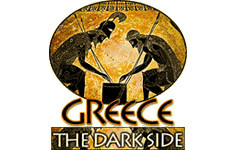 Identifying as a Jew
Identifying as a Jew


3 min read
Comparing the Greek exile to the darkness at the beginning of creation.
“No other two races have set such a mark upon the world. Each of them from angles so different have left us with the inheritance of its genius and wisdom. No two cities have counted more with mankind than Athens and Jerusalem. Personally, I have always been on the side of both.” - Sir Winston Churchill
In the Chanukah story, the Jewish people put up no resistance when Alexander the Great's troops arrived. But they were quick to resist the enlightening cultural forces that the Greeks brought with them.
Why? After all, the Jews were a people who revered education, literacy and deep thinking. In this regard the Greeks should have been their soul mates -- another enlightened people in an otherwise darkened world.
PHILOSOPHICAL CLASH
Yet for all its beauty, Greek society was morally abhorrent to the Jewish world view.
In Greek society it was common for parents to kill newborn infants. Babies in Greece were routinely murdered by leaving them outside in a clay jar to die from exposure and starvation. The reasons parents would kill their children:
Right behind infanticide on the list of what we today consider deviant behavior was pederasty. (Today we call it child molestation.)
"In most Greek communities the women were kept at home, and men spent their days with other men or boys. Artists paid special attention to the nude masculine form; and pederasty abounded. It was far more favored than homosexual relations between men and youths of the same age, and indeed a whole philosophy was built up around the pederastic situation, founded on the concept that the lover was the beloved's educator and military trainer." - “The Founders of the Western World: A History of Greece and Rome,” by Michael Grant
In Greece, the highest and purest form of love was something Jews considered to be the most heinous of crimes!
The Jewish people have always placed the utmost value on human life, and considered the relationship between a husband and a wife to be holy. That's why when the Greek culture came, the Jews said: “No!”
THE GREEK EXILE
Jewish historians label the period during which the events of Chanukah occurred as the "Greek exile." In the literal sense, however, no exile ever took place -- not one Jew was banished from the Land of Israel! Why then, do we refer to this period of history as exile?
The Midrash explains by comparing the Greek exile to the darkness at the beginning of creation. The first two lines of Genesis read: "In the beginning... the earth was empty... and darkness was upon the face of the deep." God's exclamation "Let there be Light" (Genesis 1:3) then banished the darkness. That was Day One.
But what exactly is this "Light" the Torah refers to? It cannot be referring to the physical light we're accustomed to; the sun and moon did not come into existence until Day Four!
This first "Light" must be understood as a reference to raw spiritual energy. The Greek exile is therefore seen as comparable to a universe lacking all spirituality -- a time of spiritual darkness immediately before the light of God is released into the world. Indeed, the 25th word of the Torah is Ohr -- "light" -- a reference to the 25th day of Kislev, when Chanukah begins!
Chanukah pushes away the Greek darkness.
